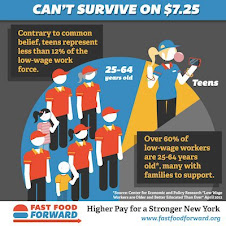Teachers report of principals who browbeat teachers during faculty meetings on the teachers' assessment of certain parts of the school.
(Incidentally, the city is also spending untold numbers of dollars on subway ads, exhorting parents to complete and submit the surveys.)
One teacher, "Miss Brave," a blogging second grade teacher, wrote of the pressure at her own school. (Thanks to Philissa Cramer at the Gothamist, "Teachers say the pressure’s on to complete the DOE’s survey," for pointed out her blog.)
Recently, we had a staff meeting about this year's Learning Environment Survey. Apparently, we didn't have high enough participation in last year's survey, so my principal wanted to give us the chance to fill it out on school time. And by "give us the chance," I mean "fill our head with strong suggestions of how to grade our school in order to get Quality Review off our backs."
Seriously, they did everything but stand over us with a #2 pencil and whisper "strongly agree!" in our ears. "Last year, some teachers claimed they didn't have frequent contact with parents, but don't forget, you send home a homework sheet every week!" "Last year, some teachers said we didn't offer a wide enough variety of courses, but don't forget, some of the third grade classes are getting a theater course!" Come on, a homework sheet? That counts as contact with parents? And that "theater course"? Is offered to an extremely limited number of classes, once a week for about six weeks. That's supposed to count? It's like we were scrabbling around for anything we could pat ourselves on the back for.
And then there's the whole Quality Review issue -- apparently, if a school receives a high enough grade on its progress report, it is exempt from Quality Review for two years. (Like, "An A keeps Quality Review away.") The learning environment survey factors into the progress report grade. So there was definitely a strong aroma of "give our school high grades just to exempt us from Quality Review" in the air of the meeting. As in, I actually overheard a teacher at the next table hissing, "Lie! Lie if it'll get Quality Review off our backs!"
Here's the thing. I don't view the survey as an opportunity to get revenge on my school (even though I'm not exactly feeling love for it at the moment). But hello, people, it's called constructive criticism, or, in my world, telling the truth. (A novel concept, apparently.) Do I feel supported by other teachers at my school? Sure! Strongly agree! But do I trust my principal at his word? Absolutely not. Strongly disagree!
I mean, don't we want to instill these values in our students? Am I moving Jonathan to a level G in reading just because it'll make him feel better and it'll make my life easier because I won't have to answer questions from my AP about why he's been an F since November? No, because you can't dress up Jonathan as a G reader and you can't dress up my school as a delightful haven for learning where everyone gets along and no one says nasty things about the principal behind his back.
So what did I do on my survey? I told the truth. My fiance says it's because I have integrity, but I say it's because I'm freaking fed up. I am fed up with being shuffled around like a substitute and with the fact that 75% of what we do is a sham to make us look good for Quality Review and does not actually benefit our students. Like, right now our administration is twisting themselves into knots to make sure that every grade has an inquiry team, because Quality Review decrees it must be so and lo, it must be! Except that in order to ensure that every grade has an inquiry team, we routinely hold inquiry team meetings that pull all the teachers from a grade out of their classrooms, and AIS and ESL teachers are dispatched to cover those classrooms, so the end result is that students are not taught. I mean, doesn't that seem backwards?!

































